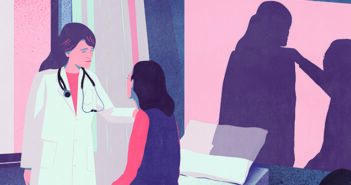Alpert medical students’ year-long projects will address health inequities.
Four Warren Alpert medical students received Albert Schweitzer Fellowships for 2017-2018. The fellowship awards each student a $2,000 stipend to design and implement a community service project that addresses health disparities and the social determinants of health.
Fellows must coordinate with community partners to identify unmet local health needs; plan sustainable projects that will continue after the fellowship ends; and evaluate the impact of their intervention. They will commit at least 200 hours to the project over the coming year, at least half of which are direct service with their client population. They’ll also attend monthly meetings to develop leadership and other skills and network with professionals and other students.
The Schweitzer fellows from the Warren Alpert Medical School this year are Anna Delamerced ’16 ScM’20 MD’20, Hiba Dhanani ScM’19 MD’19, Bryan Leyva MD’18, and Peter Mattson ScM’20 MD’20. Read more about the students and their projects below.
- When Anna Delamerced ’16 MD’20 ScM’20 attended a Schweitzer event in Boston last fall, she knew right away that she would apply for a fellowship. “The theme was how can you use your life to serve others, to serve a purpose,” she says of the event. “I was drawn to that.”
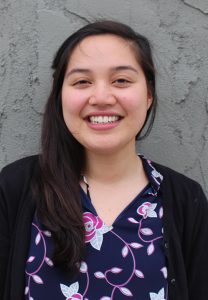
Afterward Delamerced, a student in Brown’s Program in Liberal Medical Education and the Medical School’s Primary Care-Population Medicine (PC-PM) Program, says she asked herself, “What can I do in my own community, here in Rhode Island?”
She saw a need at the assisted living facility in Warwick where she was paired with a resident last semester. “She mentioned she didn’t have family or friends in the area, and the holidays would sometimes get lonely for her. So I said, what can I do to help?” Delamerced says.
Delamerced read journal articles about social isolation among the elderly and how it can affect their health. A writer and poet who led a medical journalism preclinical elective last year, she says the life stories that the facility resident told her inspired her fellowship project: to develop a workshop series at the Warwick facility that integrates creative writing, visual arts, and storytelling.
Each week she’ll give the residents writing prompts, asking them about things like childhood memories and favorite meals. “It’s a way to spark conversation, form meaningful relationships, and a chance for them to document and share with others their life story,” Delamerced says. “Each person has multiple stories, and stories are a way to connect with others.”
As she developed her project proposal for the fellowship application, Delamerced worked with the assisted living facility directors as well her Doctoring small group leader, Elizabeth Toll, MD, clinical associate professor of pediatrics and of medicine; they will serve as her project mentors in the coming year.
The project complements one of the hallmarks of the PC-PM Program, Delamerced says: the opportunity to form long-term relationships with patients. “Interacting with other people will remind me why I’m going into medicine in the first place,” she says. “There is a bigger life outside of my library studies.”
- As a member of the inaugural class of the Primary Care-Population Medicine (PC-PM) Program, Hiba Dhanani MD’19 ScM’19 says she came to the Warren Alpert Medical School to become a provider-advocate.
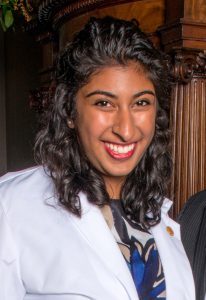 “To my very core I believe that health is a fundamental human right that every individual deserves,” she writes in an email. “PC-PM pushes us to become leaders in health care, and I think that the [Schweitzer] fellowship will give me an opportunity to use classroom skills I have learned in my community.”
“To my very core I believe that health is a fundamental human right that every individual deserves,” she writes in an email. “PC-PM pushes us to become leaders in health care, and I think that the [Schweitzer] fellowship will give me an opportunity to use classroom skills I have learned in my community.”When designing her fellowship project, Dhanani thought back to her first-year Health Systems Science course, where she learned about the connection between asthma and housing. In Providence, she notes, asthma disproportionately affects children of color and refugee children, who are more likely to live in low-income housing.
“There is a relationship between living in poor housing conditions and being exposed to asthma triggers,” such as vermin, dust mites, mold, and poor ventilation, Dhanani writes, “but parents are often concerned to talk about their housing conditions with landlords for fear of eviction.”
To address the problem, over the following year she will educate parents of children with asthma about possible triggers in their homes and the responsibilities of landlords and tenants to address them. Dhanani will work with the Rhode Island Medical-Legal Partnership, which is based at Hasbro Children’s Hospital, and the Rhode Island Department of Health to hold biweekly education sessions for parents at a community health center.
Dhanani says the opportunities to effect change and to learn from peers from multiple disciplines attracted her to the Schweitzer Fellowship. Her project mentors are lawyers: Elizabeth Tobin-Tyler, JD, MA, an assistant professor of family medicine and a senior adviser with the National Center for Medical-Legal Partnership; and Jeannine Casselman, JD, a program manager at Medical-Legal Partnership Boston.
She’ll also collaborate with local schools and asthma advocacy organizations so they can continue her work at the conclusion of her fellowship.
“The Schweitzer Fellowship project is an opportunity to work with community partners on a project that addresses specific noted needs in asthma education,” she writes. “I am excited that this project has the potential to decrease asthma exacerbation through addressing barriers to care.”
- While working for the Center for Community-Based Research at the Dana-Farber Cancer Institute a few years ago, Bryan Leyva MD’18 coordinated a trial to establish evidence-based cancer prevention programs at Catholic parishes that serve Latino communities in Massachusetts.
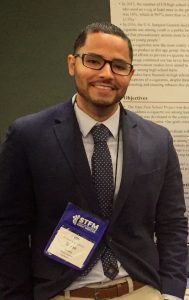 Their findings, published in the journal Translational Behavioral Medicine in June, with Leyva as lead author, suggested that faith-based organizations could be effective messengers for health care strategies among Latino and other immigrant groups.
Their findings, published in the journal Translational Behavioral Medicine in June, with Leyva as lead author, suggested that faith-based organizations could be effective messengers for health care strategies among Latino and other immigrant groups.For his Schweitzer Fellowship project, Leyva wants to apply what he learned in Rhode Island. “Churches are trusted safe spaces, especially for members of minority communities,” he says. Many already have identified health concerns among their congregations; Leyva wants to build their capacity to address them. “Pastors counsel their parishioners, they pray with the sick and dying. My hope is that with some additional training, they will do more.”
Churches have the infrastructure to maintain a health program, Leyva notes: meeting halls, members who work in medical fields, a spirit of altruism and volunteerism. This year he’ll help four churches in the Providence area build on those resources by helping to develop health ministries, or groups specifically created to promote health, and by offering training in motivational interviewing, a skill he learned as a first-year medical student.
“It’s a counseling approach to engage participants in retaking ownership in their health using intrinsic motivation,” Leyva says. “It’s an intervention that has been easy to implement for community health workers in the past.”
With this skill, he says, volunteers will be better equipped to help people quit smoking, control their blood pressure, improve their fitness or nutrition, even address depression and anxiety.
Mental health issues are particularly prevalent among undocumented and other immigrants, but stigma prevents many from seeking help, Leyva says. “Churches can facilitate access for those who need services but may not get them,” including people who lack insurance, he says.
Most churches have influence beyond their congregations and into their communities, which Leyva hopes will broaden his project’s impact. For example, a church member could teach a fitness or yoga class that anyone can attend. “They can help people get in shape, and reach out to the community in a productive, positive way,” he says. “It’s population health on a small scale.”
- Some kids want to become doctors because they love science, or they went on a cool tour of an anatomy lab, or they learned CPR. But others are inspired by less traditional medical careers: health policy, population medicine, medical design. Peter Mattson MD’20 ScM’20 places himself in the latter group. “I was exposed to public health—how systems could be improved and strengthened on a larger scale,” he says.
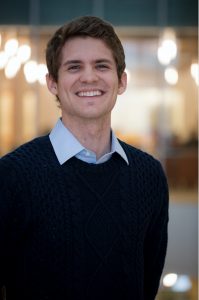 A student in the Primary Care-Population Medicine (PC-PM) Program, Mattson volunteers with Pathways, which he says uses a “traditional approach” to introduce underrepresented students to medical and other science fields.
A student in the Primary Care-Population Medicine (PC-PM) Program, Mattson volunteers with Pathways, which he says uses a “traditional approach” to introduce underrepresented students to medical and other science fields.“One of the greatest honors of my career so far has been being able to teach these students about medicine and be the first to expose them,” he says. “It might be their only opportunity in high school to see what medicine is like.”
But this year he is recruiting teens who might be attracted to medicine as a result of untraditional interests and experiences. For his Schweitzer Fellowship project, he designed HealthCORE, a course that will expose local underrepresented students to some of the other opportunities in health care.
“Medicine isn’t all biology, chemistry, molecules—it’s actually about the people we’re treating. That’s often overlooked in high school. No opportunities I had were like that,” Mattson says. “I want to help high school students have this vision earlier on, to be interested in the larger scope of medicine.”
Mattson designed a 10-class curriculum that he will offer to 24 students this summer. He’ll enlist professionals as guest speakers, offer electives tailored to students’ interests, and mentor them individually. By the end of the program he hopes at least three-quarters of them will demonstrate increased interest by participating in optional health care opportunities over the upcoming academic year.
Like the PC-PM Program, the Schweitzer Fellowship “is one more opportunity to look at the medical field on a larger scale,” Mattson says. Increasing diversity among practitioners is paramount: “Patients are getting more and more diverse as we go, and we need physicians and health care professionals who are equipped to understand and empathize with these patient populations.”


